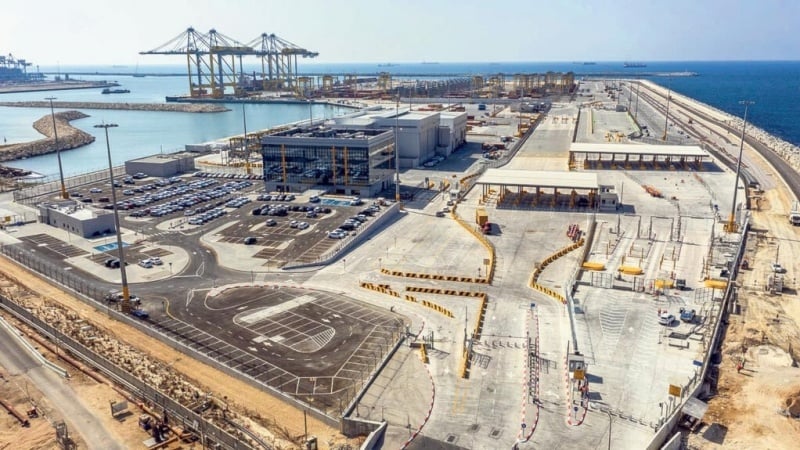The port city of Eilat in the territories occupied by the Zionists, which once fueled Israel’s trade, energy, and tourism, is now in a state of critical security crisis, financial paralysis, and widespread public distrust.
The analytical website Al-Khanadeq reported on Tuesday, referring to the closure of the port of Eilat in the south of occupied Palestine following continued Yemeni attacks, stating: “The decision to completely shut down this port was not sudden but rather the culmination of a gradual erosion that began in late 2023 with the start of the naval operations by the Ansarullah movement in support of Gaza.”
According to Pars Today, the Yemeni operations exposed the weaknesses in the Zionist regime’s critical infrastructure, turning the port of Eilat into a symbol of the collapse of shipping and the economy in the southern part of this temporary regime.
Al-Khanadeq further noted that the port of Eilat “was a strategic link connecting Asia and Europe via the Suez Canal and the only gateway for the Zionist regime to the Red Sea. However, due to repeated naval attacks by Yemeni forces, the port was severely damaged, to the point where maritime activities nearly came to a complete halt, and ship insurance costs surged by 270%, forcing international companies to reroute.”
Mounting debts
The report added: “The port’s debts exceeded $100 million, and revenues dropped by 85%, to the extent that the Eilat municipality froze the port’s bank accounts due to its inability to pay taxes, losing any hopes for its revival.”
According to Al-Khanadeq, “Yemeni attacks were not limited to disrupting shipping but also delivered precise and heavy blows deep into the Occupied Territories. A striking example occurred on July 16, 2025, when Ansarullah carried out four simultaneous operations targeting the port of Eilat, Ben Gurion Airport, and the Negev region using ‘Zulfiqar’ ballistic missiles and advanced drones.”
While the Israeli military tried to downplay the damage, Al-Khanadeq cited resistance sources emphasizing that “all targets were accurately hit.”
Economic disaster
Al-Khanadeq wrote that “the repercussions of these strikes were disastrous for the Zionist regime’s economy, particularly in trade, automotive, and energy sectors.” The port, which handled half of Israel’s car imports, has been completely inactive since November 2023, leaving tens of thousands of vehicles stranded.
The media outlet noted: “Strategic projects such as the Eilat-Ashkelon oil pipeline, which transported Emirati oil to Europe, and the massive $27 billion railway project linking Eilat, Haifa, and Ashdod were halted due to threats from the resistance’s naval operations.”
Another part of the report highlights the collapse of Eilat’s tourism industry: “The city, which once attracted around one million tourists annually, is now in a state of security alert and complete economic paralysis. The closure of major routes, including Highway 12, and the heavy military presence have drastically reduced tourism activities, with expected losses amounting to millions of shekels. Public trust in the region as a safe destination has been severely damaged.”
Reactions
Al-Khanadeq also pointed to political and military reactions, stating: “In response to these developments, the Zionist regime attempted to contain the crisis by requesting direct U.S. intervention to target Yemeni forces and forming an international coalition to protect shipping—an action that amounts to an explicit admission of the failure of Israel’s defense systems against this new type of threat.”
Meanwhile, the UN Security Council extended its mission to monitor attacks in the Red Sea, but the abstentions of Russia, China, and Algeria “signaled existing divisions within the council and highlighted the growing legitimacy of Yemen’s resistance against U.S. and Israeli hegemony among some nations.”
No safe passage for the occupiers
According to the website, Ansarullah, “as part of the Axis of Resistance from Yemen to Gaza, has successfully imposed a new deterrence equation—one with a clear message: No passage is safe for the occupiers.”
Al-Khanadeq concluded: “The port of Eilat has now become a symbol of the Zionist regime’s strategic exposure—a port that was once a symbol of expansion and economic prosperity is today a sign of shrinking power and declining deterrence.”
The media outlet asserted: “Yemen’s resistance has forged a new reality that was unimaginable just a few years ago—a reality that redefines the battlefield and shows that the war against the occupiers now stretches from Saada to Ashkelon and from Gaza to the Red Sea.”



